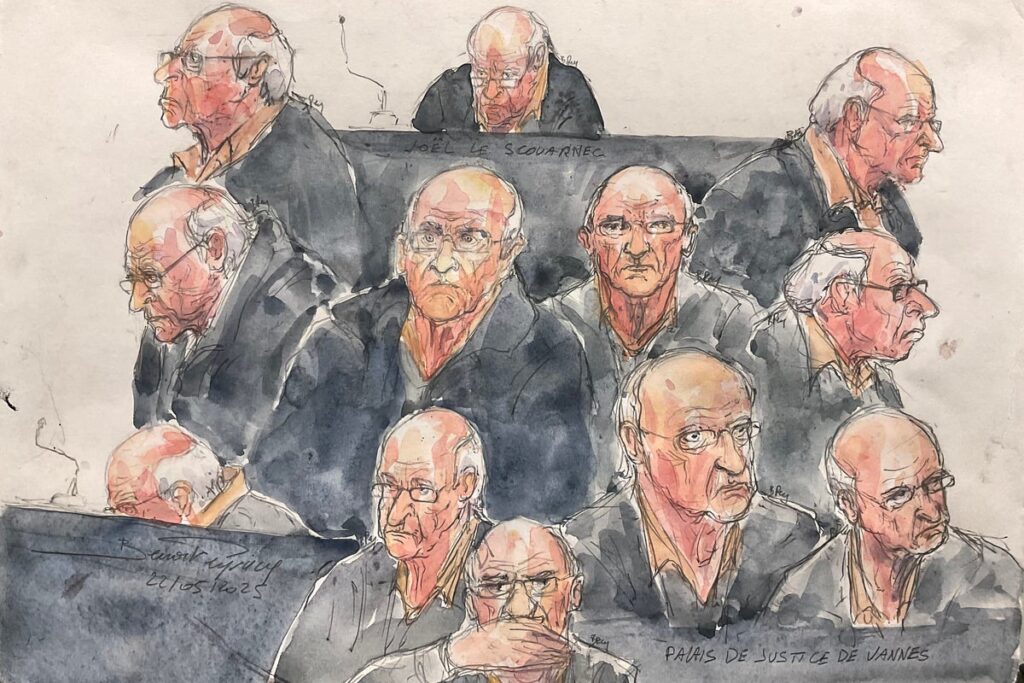Unveiling France’s Largest Child Abuse Case: A Deep Dive into Joel Le Scouarnec’s Crimes and the Justice System’s Shortcomings
“You embodied evil, yet sometimes wore a white coat,”
Prosecutor Stéphane Kellenberger delivered this stark statement to Joel Le Scouarnec during the culmination of France’s most extensive child abuse trial to date. The case sent shockwaves through a nation already shaken by other notorious sex crimes, exposing a horrifying pattern of abuse spanning over two decades.
The Extent of the Atrocities
Le Scouarnec, a former surgeon, was found responsible for assaulting 299 minors over a 25-year period, with victims’ ages averaging around 11 years old. The sheer volume of victims and the duration of his crimes have made this case a grim milestone in France’s criminal history.

Despite the gravity of his crimes, the legal framework limited his maximum sentence to 20 years, a decision that has left many victims and their families disillusioned. Tragically, two victims had already taken their own lives before the trial, unable to see justice served.
One mother, whose child was among the victims who died, expressed her despair outside the courtroom: “Today’s verdict fails to safeguard our children and grandchildren in France.”
Convictions and Ongoing Investigations
Le Scouarnec was convicted of sexually assaulting 158 boys and 141 girls between 1989 and 2014. This staggering number raises critical questions about how such a prolific offender evaded detection for so long.
In response, French authorities have launched an independent investigation into potential negligence or complicity by public institutions or individuals who might have prevented or overlooked the abuse.

Homayra Sellier, director of Innocence in Danger-an organization supporting 40 alleged victims and participating as a plaintiff-highlighted the systemic failure: “It’s rare for someone to commit such heinous acts over so many years without the knowledge of those around him.”
Judge Aude Buresi echoed this concern during sentencing, stating, “Your actions thrived in a medical environment that failed to recognize the danger, allowing your crimes to continue unchecked.”
Historical Parallels: The Gisèle Pelicot Case
The case of Le Scouarnec echoes the earlier case of Gisèle Pelicot, who publicly revealed her abuse after her ex-husband, Dominique Pelicot, and 50 others were convicted of raping her in a high-profile trial in Avignon. This case sparked a nationwide debate on sexual violence and the pervasive culture of silence surrounding such crimes.
Le Scouarnec’s crimes included assaulting victims while they were unconscious, a chilling parallel to Pelicot’s case, which exposed the brutal reality of sexual violence in France.
A Troubling Past and Continued Loopholes
Le Scouarnec’s criminal history predates his most recent convictions. In 2005, he received a suspended four-month sentence for possessing child pornography. Remarkably, he was able to secure employment as a surgeon at a public hospital in Quimperlé, western France, the following year.
His ability to work with children persisted despite previous convictions, raising questions about the adequacy of vetting procedures. It wasn’t until 2017, when police uncovered diaries detailing his sexual assaults across multiple hospitals, that authorities re-arrested him on suspicion of raping his six-year-old neighbor.
The Hidden Evidence: Notebooks and Graphic Confessions
In 2020, Le Scouarnec was convicted of raping and assaulting his young neighbor, two nieces, and a four-year-old patient, resulting in a 15-year prison sentence. Investigations into his personal notebooks revealed detailed, graphic accounts of his abuse, including a document titled “My Paedophile Letters,” according to The Guardian.
Many victims only discovered their victimization years later, often through police contact. One woman, who had her appendix removed at age 10 by Le Scouarnec, learned of her assault in 2019, over two decades after the fact. She recounted her shock upon reading his notes, which contained her personal details and explicit descriptions of her abuse.

During the trial, Le Scouarnec admitted that he viewed his victims as mere objects of his fantasies, but later expressed remorse, acknowledging that he began to see them as individuals with emotions and struggles.
Legal Proceedings and the Question of Justice
The trial, which commenced on February 24, lasted nearly four months. Le Scouarnec pleaded guilty midway through proceedings, yet the maximum sentence he faced was capped at 20 years, a reflection of France’s legal limits for multiple charges.
His lawyer, Maxime Hessier, stated that his client did not plan to appeal and hoped to make amends with his victims. “Justice has been served today,” he declared.
However, critics argue that the legal system’s structure means that even with multiple convictions, offenders like Le Scouarnec are only sentenced for their most serious crime-here, aggravated rape. This has led to calls for reform.

Prosecutor Myriam Guedj Benayoun criticized the current sentencing framework, noting that Le Scouarnec could potentially be released as early as 2030, given the maximum sentence. She emphasized the need for legal reforms to prevent repeat offenders from walking free.
A survivor, who was just 10 when abused, expressed her outrage: “In the U.S., he would have received a life sentence. It’s unbearable that someone like him could be released after only 20 years.”
Legal advocate Marie Grimaud summed up the sentiment: “My clients expect justice that truly reflects the severity of their suffering. In France, whether you assault one child or hundreds, the punishment remains the same-an injustice that must be addressed.”
Support is available for those affected by sexual violence. If you need help, contact Samaritans at 116 123, available 24/7.

